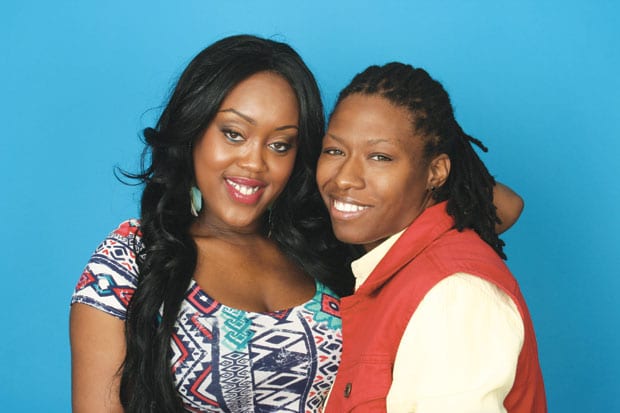Amanda Robinson and Antionett Thomas’ Real Live Connection aims to prevent LGBT youth from making the same mistakes they did

Antionett Thomas, left, and Amanda Robinson are girlfriends and co-founders of Real Live Connection, which is staging a Teen Pride event Saturday.
ARNOLD WAYNE JONES | Life+Style Editor
Amanda Robinson is the first to admit that her past isn’t one without blemishes.
“I sold drugs from a young age,” she says matter-of-factly. “I was convicted of two felonies.” People told Robinson that her background was her destiny. Not only was she a felon, she was gay and black and a woman, perceived by some as “strikes.” She’d never have a career; her future was not bright.
She might have believed the naysayers. But she didn’t.
“I wasn’t a bad kid, I just went in the wrong direction,” she explains. “I had an entrepreneurial spirit, I was just not applying it in the right way.” She needed, she now puts it, “to tweak my recipe.”
Robinson turned her life around. She’s now a manager at Station 4, where on a nightly basis she resolves issues for customers — some of whom have issues of their own.
“I’m out mingling with the customers, so I deal with these problems. I see on a nightly basis where it’s possible to make a difference in people’s lives.”
To make a difference, Robinson and her girlfriend, Antionett Thomas, established the nonprofit Real Live Connection more than a year ago as an outreach to at-risk teens.
“There’s nothing else like it here,” Thomas says.
They both feel they know what it’s like to be different and where a guiding hand can make a difference.
“I was an exotic dancer for two years and a lot of people think there’s no going back from that,” Thomas says. “But that’s not true. It’s about the direction.”
Since establishing Real Live Connection, Robinson and Thomas have moved around the city, meeting with teens and tweens, giving motivational speeches and mentoring those who aren’t headed in the right path. Sometimes the bad choices they make have nothing to do with being gay. But often they do. And either way, RLC’s goal is to give them the skills to set out on the right path.
“We wanted to create an organization that could educate, develop and connect,” Thomas explains of their three-pronged approach. “We educate on financial issues, on life skills, how to deal with coming out.”
It can be especially complicated for youth, who rely on their support systems financially and emotionally.
“We teach them how to deal with the loss of friends once you come out — and it does happen,” Robinson says.
The next prong is to cultivate the talents youth cannot always pursue. For example, they may be interested in fashion design but don’t know anyone who does it or what it entails.
RLC will set students up with mentors who give them feedback.
“We hold classes once a month to introduce them [to a mentor]. Then after, we have a social event,” Thomas says.
The social event is part of the “connect” in Real Live Connection. It’s about building a wider community of friends — not just classmates in your school, but other LGBT youth with similar issues … and perhaps similar dreams.
“We were those kids who wished there was something for us when we came out in high school,” Robinson says. “I grew up in a small town and identifying as LGBT was hard — I didn’t have the resources.”
In the past, these services might have been offered as after-school programs or by rec centers. But budgetary issues make those all but a memory for many kids. “They have no social network except for Facebook,” Thomas notes.
The biggest event they’ve attempted so far is the Teen Pride gathering, set for the Caven parking lot in the gayborhood on Sept. 14. It’s intentionally planned to coincide with
Dallas Pride to give teenagers a way of participating in Pride that is focused on their age group. (The event — which will include a DJ, food, refreshments, speakers and performances, is free for teens and $5 for adults.)
Gay youth are an emphasis for Robinson and Thomas not just because they are gay, but because statistically those are some of the most at risk.
“The average age to come out now is 13,” says Thomas, who was 14 when she came out — and the only out gay kid in her entire school. “I was more ridiculed by the staff in the school than by my peers. [Kids that age] already feel like an outcast and when someone is supposed [to be straight and isn’t], it adds to problems.”
“[Gay teens] make up 20 percent of the juvenile justice system,” Robinson says. “Studies show three out of five gay kids feel uncomfortable in school. The suicide rate [among LGBT youth] is crazy — 43 percent of the ones dying are transgender. When we realized that, we started teaching life skills to make [teens] more productive adults quicker. The things you hold onto from your past are hindering you moving forward in your future.”
“Being different does not create limitations,” Thomas adds. “Just because that’s where my past is doesn’t mean it’s my future.
……………………
Teen Pride 2013 Noon-4 p.m Sept. 14. 4001 Cedar Springs Road, behind Zini’s on Throckmorton in the parking lot. Admission is $5 or free with student ID (K-12 or younger). TinyURL.com/TeenPride.
This article appeared in the Dallas Voice print edition September 13, 2013.


